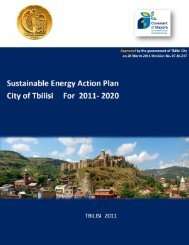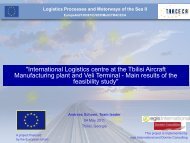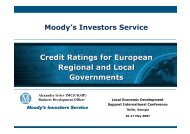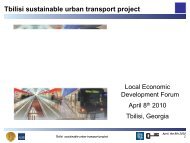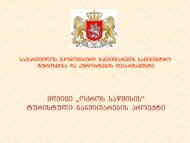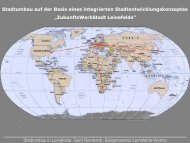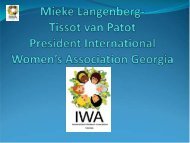LOCAL ECONOMIC DEVELOPMENT PLAN FOR TBILISI ... - LED
LOCAL ECONOMIC DEVELOPMENT PLAN FOR TBILISI ... - LED
LOCAL ECONOMIC DEVELOPMENT PLAN FOR TBILISI ... - LED
You also want an ePaper? Increase the reach of your titles
YUMPU automatically turns print PDFs into web optimized ePapers that Google loves.
In addition to being the leading global reformer, Georgia was the leading reformer in<br />
three of the specific areas studied by the report:<br />
(1) Dealing with licenses: The report looks specifically at construction licenses and<br />
permits, and this year Georgia created a one-stop shop for building permits. Shorter<br />
time limits for the issuance of permits were introduced, and several unnecessary<br />
procedures were eliminated.<br />
(2) Enforcing contracts: Georgia established specialized commercial sections in the<br />
courts. Also, the supreme court can now decide which cases to review. Previously, it<br />
dealt with every case sent by the lower courts. In addition, Georgia has been striving<br />
to reduce corruption in the courts by increasing judges’ salaries and more<br />
aggressively investigating corruption and taking disciplinary measures against judges.<br />
(3) Employing workers: The new labor code eases restrictions on the duration of<br />
term contracts and overtime work. The new law provides for one month’s severance<br />
pay, replacing complex rules requiring varying notice periods and the involvement of<br />
labor unions and the Ministry of Labor. Georgia also reduced the social security<br />
contributions paid on wages by businesses from 31% to 20%. Together, these<br />
changes make Georgia the sixth easiest place to employ workers globally (after the<br />
Marshall Islands, United States, Singapore, Tonga, and the Maldives). In addition,<br />
Georgia made strides in increasing the ease of starting business. Georgia reduced the<br />
minimum capital required to start a new business from 2,000 lari to 200 (US$85). As a<br />
result, business registrations rose by 55 percent from 2006 to 2006, reflecting both the<br />
creation of new businesses and the registration of companies formerly operating in the<br />
shadow economy. In the area of getting credit, Georgia also has made some<br />
legislative changes to facilitate the exchange of credit information, and a private credit<br />
bureau began to support the exchange of information among banks.<br />
While Georgia is the leading reformer this year, there are still several areas where<br />
there is considerable room for improvement. In the ease of paying taxes, for example,<br />
Georgia ranks only 104 globally. Although tax reform in previous years has simplified<br />
taxes and decreased rates, a company still spends about 53 days per year to pay<br />
taxes. Georgia also is relatively poorly ranked in closing a business (ranked at 86),<br />
suggesting a need for bankruptcy reform. Another priority area is trading across<br />
borders, where Georgia ranks at 95, due to a relatively high cost to import and export<br />
and a large number of required procedures.<br />
Finally, Georgia ranks only 135 on protecting investors, lower than most of its CIS<br />
colleagues. The International Finance Corporation is engaged on the ground in<br />
supporting Georgia’s reform efforts. With support from BP and the Government of<br />
Canada, it provides technical assistance in the area of SME policy work. The IFC<br />
SME Policy Project tightly cooperates with the Georgian government to further<br />
improve two regulatory issues: inspections and permits/licenses. The project is<br />
working on streamlining licensing and inspecting procedures according to international<br />
best practices. It also conducts regular surveys of entrepreneurs, providing first-hand<br />
information on administrative barriers hindering business growth. The IFC SME survey<br />
reports provide clear recommendations for improvement to the government. The<br />
survey instrument is also used to measure the effect of administrative reforms on<br />
businesses against a baseline established by IFC’s first Georgia survey, conducted in<br />
2004. Recently, the project has finalized its second survey, polling 1880 SMEs in 11<br />
regions throughout Georgia. The survey covers 4 key issues for SME sector<br />
development: licenses and permits, inspection system, tax administration and exportimport<br />
procedures, the World Bank noted in Doing Business 2007: ”Georgia makes<br />
an unprecedented jump up the global rankings” http://web.worldbank.org/




